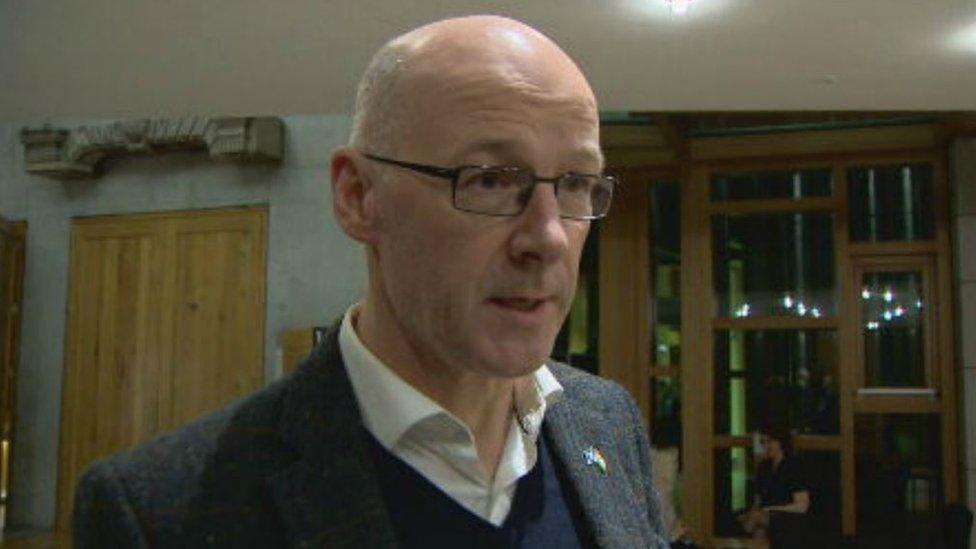MSPs vote to stall named person bill consideration
- Published

The legislation would appoint a named person responsible for ensuring the welfare of each child in Scotland
The Scottish government's named person scheme has been delayed after MSPs refused to move legislation along.
MSPs are in the process of considering changes to the system to settle issues raised by the Supreme Court.
A bill was to go before the chamber before the end of the year, but the education committee has voted against publishing a stage one report.
Parliamentary rules mean the legislation cannot proceed until a committee report has been completed.
Education Secretary John Swinney said the government would "reflect" on the move, but said he was "committed" to the named person policy.
The scheme would appoint a named person, usually a teacher or health visitor, to be responsible for ensuring the welfare of every child.
The plans were approved by MSPs in 2014, but were quickly tied up in legal challenges by campaigners who feared they could cause unnecessary intrusion into family life.
Judges at the UK's highest court ruled against the scheme in July 2016, citing concerns that information sharing plans were incompatible with the rights to privacy and a family life under the European Convention on Human Rights.
The bill being considered by MSPs was a bid to correct these information sharing rules in order to let the system be implemented.
But the education committee wants to see a draft code of practice before it agrees a report on the Children and Young People (Information Sharing) Bill.
Mr Swinney has previously said a draft code of practice could not be produced until September 2018 "at the earliest" - warning that failure to produce a report could "significantly delay" the implementation of the scheme.

John Swinney said the government remained "committed" to the named person policy
Holyrood's standing orders state that parliament will only consider the general principles of a bill "in light of the lead committee's report".
SNP members on the committee wanted to produce a stage one report, but they were voted down by other MSPs, who agreed that the committee should instead extend the period of scrutiny.
In a letter to the education secretary last week, committee convener James Dornan - an SNP member - said the majority of members "do not consider that they are able to make a decision on whether to recommend that the general principles of the bill be approved at Stage 1 until the Scottish government has provided the committee with an authoritative draft of the code".
At the time, Mr Swinney replied noting "regret" at the decision, saying that "the committee is not being asked to approve the code".
He said a delay to the stage one process was unnecessary and asked the committee to "signal its support for the general principles of the legislation" while continuing scrutiny of the code of practice "in parallel".
'Confrontational approach'
Committee members rejected this approach by six votes to five, instead agreeing that they should "extend the period of stage one scrutiny to provide the committee with the opportunity to scrutinise a draft code of practice alongside the bill".
They are to write to the parliament and presiding officer calling for an extension to the legislative process, and said they would write to Mr Swinney to explain their decision.
Committee members hinted that the education secretary's approach had played a part, with Tavish Scott saying that "no committee will be told what to do by a government minister who throws his weight around" and Ross Greer saying "a confrontational, head in the sand approach" would get the government "no further".
The education secretary said he would "reflect" on the move, but said it was "really important that we press ahead with the legislation".
He said: "Obviously the government will reflect on what the committee has to say, but the government is committed to the named person policy - it's a good policy to support the wellbeing of children and young people and that should be parliament's priority."
- Published29 November 2017

- Published17 August 2017

- Published20 June 2017
